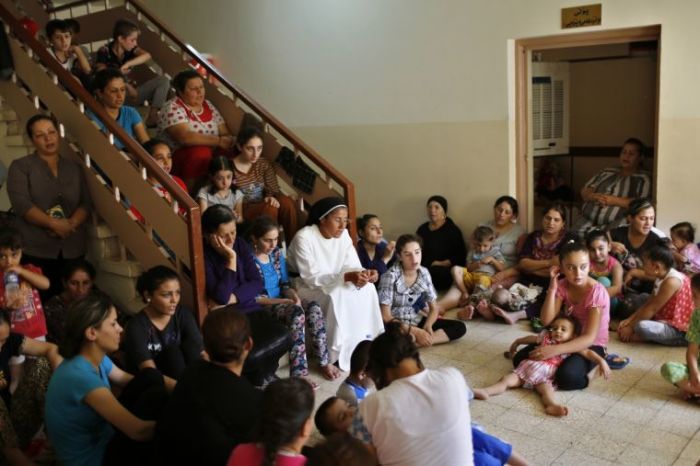Hundreds of Iraqi Christian Families Forced to Flee Again After Resettling in Town Liberated From ISIS

Hundreds of Iraqi Christian families who recently returned to their hometown after being displaced for years by the Islamic State were forced to flee again from a town in northern Iraq because of conflict between Iraqi government forces and the Kurdish peshmerga.
A source with knowledge of the situation told The Christian Post that hundreds of families in the Kurdish town of Telskuf were warned by the Iraqi army on Tuesday evening to flee the town because Iraqi forces were planning to retake the Kurdish-controlled town with heavy weapons and shelling on Wednesday after skirmishes and gunfire broke out during the day on Tuesday.
About 1,000 Christian families had settled back into the town, which lies about 20 miles north of Mosul, after it was liberated from the Islamic State a year ago. The town has been viewed as somewhat of a model for the return of Christians to their ancient homeland in the Nineveh Plains.
But after the warning from the Iraqi army, nearly all of the Christians who had returned to Telskuf after being displaced from their homes fled their hometown again and sought shelter in the town of Alqosh. According to the source, the only people who stayed in Telskuf were a priest and a handful of people who worked for the local church.
Although they were forced to evacuate in preparation for a military showdown, the source told CP many of the Christian families were in the process of returning to the town on Wednesday afternoon after external diplomatic pressure applied to the Kurdish Regional Government and the Iraqi government created an "uneasy peace."
"After a lot of outcry from a number of different quarters, people are moving back to the town from Al Qosh," the source explained. "There is kind of an uneasy peace and a hope that this will be resolved without conflict in the town."
"This is the town that the Hungarian government put $2 million into rebuilding and was the model for repopulating minority communities and towns that had been [taken over] by ISIS," the source added. "As you can imagine, the Hungarians are not happy about this town being in the line of fire. Nobody wants this to be collateral damage in a contest between these two entities. It's a Christian town and you have the Kurdish peshmerga and the Iraqi army fighting over it and the people who had just faced genocide and just moved home are going to be the unintended victims here."
Carl Anderson, head of the Catholic-fraternal organization and advocacy group Knights of Columbus, said during a speech at the 2017 In Defense of Christians solidarity dinner in Washington, D.C., Wednesday night that the U.S. government played a role in helping defuse the situation in Telskuf. Anderson made the remark before introducing keynote speaker, Vice President Mike Pence.
"We are very grateful that just this evening American government involvement was able to stop the planned battle for Telskuf — a town in Nineveh recently liberated from ISIS and rebuilt with a $2 million grant from the government of Hungary," Anderson said. "The destruction of that town could have been in a very real way, the beginning of the end of Christianity in Iraq. There are so few towns left that every one of them is precious. While the peace is fragile, we are grateful for our government's attention to this issue. We hope that the vice president will convey our gratitude to the president for this action."
Although tensions have been lowered in Telskuf, the source told CP that "it's touch-and-go and it could still go sideways."
"If this had gone really badly, people there were saying that this would basically be the end of Christianity in Iraq," the source asserted. "If a Western government-rebuilt town where everybody had moved home after the genocide — the big success story — went upside down, how could people see any future there?"
Displaced Christian communities in Iraq have had a hard time resettling to their hometowns because they have experienced a shortage of funding and have received very little, if any, resources from the U.S. government and the United Nations to rebuild the infrastructure in their towns.
Although the Hungarian government, the Knights of Columbus and other humanitarian organizations have supported rebuilding efforts in some Iraqi Christian communities, advocates have cried out for foreign governments to provide more support.
On Wednesday, Pence answered that call, telling a roomful of Christian leaders from the Middle East that President Donald Trump has ordered the U.S. State Department to provide aid directly to faith-based organizations and other groups serving the displaced Christian and other religious minority communities.
"We will no longer rely on the United Nations alone to assist persecuted Christians and minorities in the wake of genocide and the atrocities of terrorist groups," Pence explained. "The United States will work hand-in-hand from this day forward with faith-based groups and private organizations to help those who are persecuted."
According to Kurdistan 24, four civilians were injured by shelling from an Iranian-backed paramilitary allied with the Iraqi forces in Telskuf on Tuesday. Two of those injured were Christians.





























